Our Swiss Birth
The Expat Bump Diaries: Week 40
After the false alarm that saw us in hospital at less than 37 weeks pregnant on New Year’s Day (featured in my last post), Baby Number Two decided it would keep us on our toes for several more weeks. My husband was on constant alert while at work, and I was banned from calling him unless I was in labour. Our hospital bags were left next to the front door just in case, and every cramp and contraction, of which there were many, had us wondering if this was finally the moment.
I could not wait for the day to come. The baby had dropped so low into my pelvis that I was really uncomfortable and had shooting pains into my thighs. My due date came and went on 26 January to our disappointment, as more than three weeks earlier after our false alarm we couldn’t imagine we would make it that far. My husband’s birthday would be three days later, 29 January, and we joked how funny it would be for him to share the day.
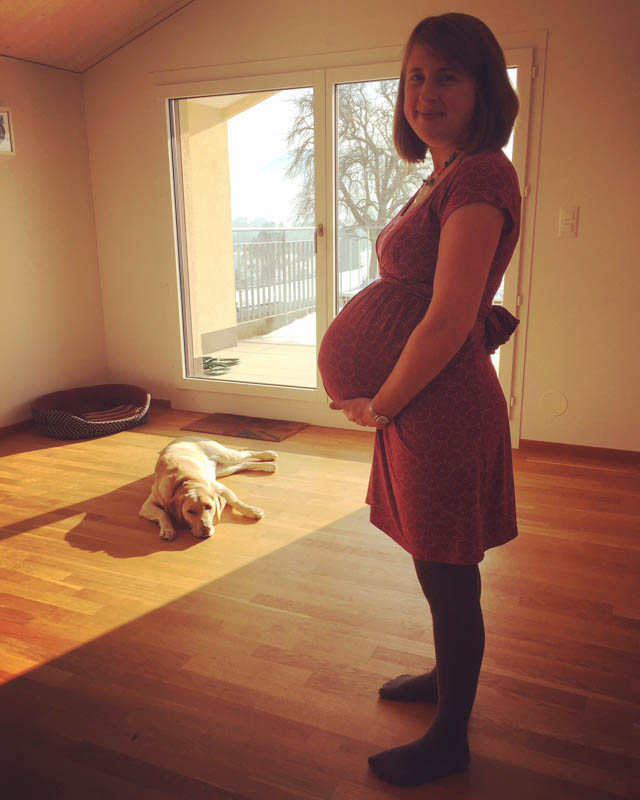
Labour begins at home
At 4:45 in the morning of my husband’s birthday the now very familiar feeling of my stomach tightening and period-like cramps started. For an hour or more I lay in bed focusing on how my body was feeling, without rolling over to say anything to my husband, as I didn’t want to get his hopes up yet. The contractions kept coming every 15 minutes and began to feel stronger than any I had had in the previous few weeks, so I became hopeful, finally breaking the news to my husband that he might be getting an extra birthday present.
We stayed in bed resting for more than two hours and I started using the techniques I learnt on a hypnobirthing course I went to in the fortnight before the birth. With each contraction (known as a “surge” in hypnobirthing language) I used long, slow, in-and-out breaths and concentrated on relaxing every muscle in my body, especially my jaw, as this has a connection to the pelvic area. I also tried to think positively, reminding myself that birth is a totally natural process and not to panic and fight my body, but instead to try to go with it.
At 7:20 I got up and had a bath and the surges started to become stronger and more frequent as I was moving around. At 8:30 our toddler woke up, and we spent the next couple of hours having breakfast as a family, giving my husband his birthday presents, and getting my daughter ready to stay with friends, all with me stopping occasionally to breathe through the surges. At 9:45 I thought my waters had broken but later realised it was the “bloody show.”
Just after 10:00 our daughter was picked up by our very kind friends. The surges weren’t coming any more regularly so we decided to stay at home for a while longer. I forced my husband to stop watching Nadal versus Federer in the Australian Open tennis final (he joked that if the baby was a boy he should be called Roger or Rafa depending on the result) and made him watch a comedy DVD with me, to try to boost my endorphins and keep labour moving. I kept changing activity – walking, bouncing on a yoga ball, or rocking on my knees – as I desperately didn’t want the contractions to stop again. It was a gloriously sunny day and the light was pouring into the house. Usually that’s a good thing, but in my labouring state I couldn’t stand it and remembered that a room with low light is better for keeping labour going, so I went and hid in a darkened room with a hypnobirthing track on my iPod.
Hospital delivery
At 13:30, we finally decided that, although the contractions were still erratic in frequency, they were getting stronger and we should make the three-minute drive down the hill to our local hospital, Paracelsus Spital in Richterswil. When we arrived we went straight to the spacious delivery room and got settled in. A monitoring belt was strapped to my bump so that the midwives could keep an eye on the baby’s heartbeat and the frequency of the contractions. I was pleased that this belt was wireless so I could move around and even get into the birthing pool with it on. This was one of the key things that I believe made my second birth experience totally different from the first.
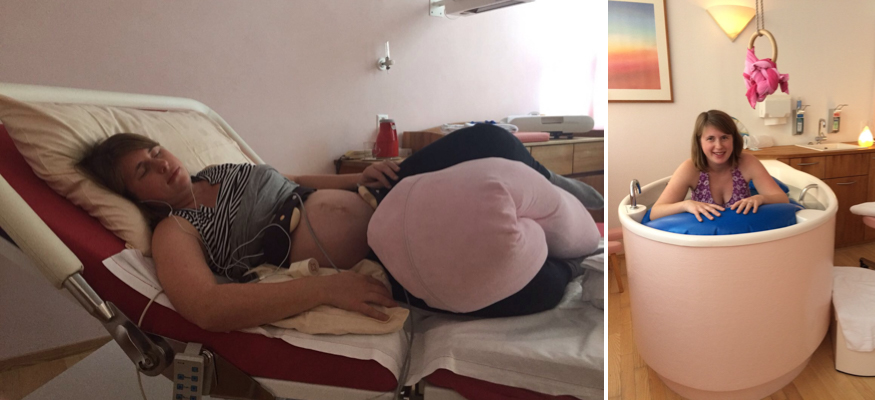
When I gave birth to our first child in the UK, I did not have what I would describe as a perfect delivery. I had been diagnosed with gestational diabetes during the pregnancy and so had to be on the higher dependency labour ward instead of the midwife-led birthing centre at our hospital in Cambridge. Throughout the labour I had to wear a monitoring belt that was wired up, so my movement was limited. I spent much of the labour on hands and knees on the bed but when the time came to push I was asked by the midwife to lie on my back so that they could keep the monitoring belt in place. I struggled to deliver the baby – I wonder whether this was partly due to the less-than-ideal position – and the medical team decided that the baby was getting distressed and that they needed to intervene. The doctor overruled the midwife, who questioned whether an episiotomy was really needed, so an incision was made and a ventouse (a machine that uses air suction to attach to the baby’s head) was used to pull the baby out. My daughter was left with a bruise on her head from the ventouse, and the stitches I had as a result of the episiotomy took an extremely long time to heal. While I was glad that the baby was safe and well, I felt disappointed I didn’t get to experience delivering her myself. When I arrived at the hospital in Switzerland in labour with my second baby I told the medical team about my first birth and how I hoped for a different experience this time.
At 14:25 the on-duty gynaecologist did an internal examination and found I was around three centimetres dilated. My husband put on some relaxing music and dimmed the lighting while I kept moving around. As they came in and out, the medical team commented on what a relaxed atmosphere there was in the room. Just under an hour later I was rocking on my knees on the floor with my upper body resting on a yoga ball breathing through the surges when the midwife who would later deliver our baby, Anne-Catherine, came to introduce herself, as she had just started her shift. As I knelt upright to speak to her my waters broke. From there the labour took a much faster turn.
At around 16:00 I got into the birthing pool. I hadn’t been dead set on using a birthing pool, but I was open to giving it a go and I was glad I did. I love being in water and the weightlessness it gives you during labour really does seem to help. At first I was still happy to chat with my husband but soon the surges began ramping up and I had to focus internally to cope with them. I noticed I was making a moaning sound with each surge that I wasn’t really in control of. I tried to concentrate with all my might on using the hypnobirthing breathing and to relax every muscle. I began to struggle because the surges were becoming so strong my whole body was shaking after them, so I asked my husband to use light touch massage, another hypnobirthing technique designed to release endorphins. That helped take the edge off, and feeling his presence and support was comforting.
At 17:15, I felt the urge to push and the second stage of labour began. Of course I wasn’t checking the clock – time had become a distorted blur to me – but my husband was dutifully noting down the important moments. Shortly before this I came to the point that I didn’t think I could take any more. However, I remembered from the hypnobirthing course and the National Childbirth Trust (NCT) course I did in the UK that this feeling often comes just before the pushing begins, so that gave me the hope and strength to keep going, as the end was in sight. I think this kind of clarity of thought was thanks to me being free of any painkillers during this birth. When I delivered my first daughter I used Entonox (“gas and air,” or nitrous oxide plus oxygen). I am enormously surprised to say this – because a couple of months ahead of the birth I was terrified of not having Entonox and so glad that my hospital was one of the few in Switzerland that offer it – but I’m so glad I went without, as my head was clearer and I felt more in control this time.
I don’t know quite how I got through those final stages of pushing. It was certainly one of the hardest things I have ever done. I was so focused internally that I don’t think I opened my eyes for the final 45 minutes, but I heard the words of my husband beside me as he reminded me to loosen my jaw and gave me words of encouragement, and I followed the directions of the midwife and gynaecologist as they advised me to change position or internalise the noises I was making to use my energy in the best way. It took every ounce of my energy and mental strength, particularly to get through the crowning, but then I heard the midwives telling my husband the baby would be here with the next contraction and asking him to get into position ready to catch the baby in the water (luckily he plays rugby!). Finally I felt the utter relief of the baby’s release and the indescribable, surreal joy of my husband handing the baby to me. It took us a moment to remember to look; then my husband declared “it’s another girl!” Maya Jane was born at 17:59 weighing 3.49 kilogrammes ( or 7 pounds, 11 ounces to us Brits who still don’t think in the metric system) and 50.5 centimetres long.
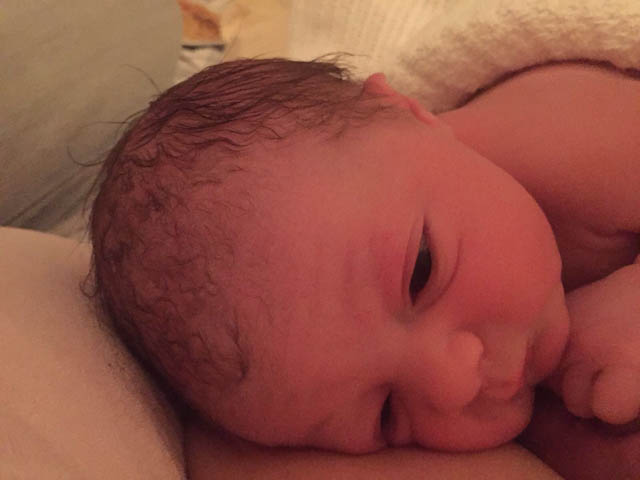
The joy turned to worry shortly after, however, as the midwife was concerned that Maya wasn’t breathing properly, because she had the umbilical cord around her neck when she was born and was caught underwater for a moment. The cord was cut and Maya was hurried over to be placed under a heat lamp and a pipe with oxygen was held close to her mouth. Still in the birthing pool, I could only see a huddle of people around the baby, including my husband, which was a little scary. Thankfully it didn’t take her long to start breathing normally, but her blood oxygen levels were monitored for a while. Finally she was brought back to me for our first cuddles out of the water.
Postnatal care
From the moment Maya was born, the postnatal care I received at our Swiss hospital was second to none. In the UK after I delivered our first daughter I found that almost all of the aftercare is centred around the baby. Once all of the immediate care for the mother was complete, from the delivery of the placenta to stiches, I was essentially left to myself. I remember hobbling to the shower alone and feeling so weak and shaking as I tried to wash. In Switzerland the midwife, Anne-Catherine, was attentive from the word go, helping me carefully out of the birthing pool, making sure I didn’t sit up too quickly, bringing me food and drink, even helping me to the shower. This was the kind of care that I received as a new mother throughout my three-night stay at the hospital.
In the UK we were in hospital for just 18 hours after the birth. The noisy postnatal ward was shared with around 30 other mothers and their babies so it wasn’t a place you wanted to stay for long. At our local Swiss hospital those with standard Swiss insurance stay in a room shared with just one other mother and baby. If you’re lucky enough to have private insurance, as we do, you can book a private room or even a family room with space for your husband and any other children to stay over too. I stayed in a private room while my husband looked after our toddler and dog at home and brought our older daughter in regularly to visit her new baby sister and me.
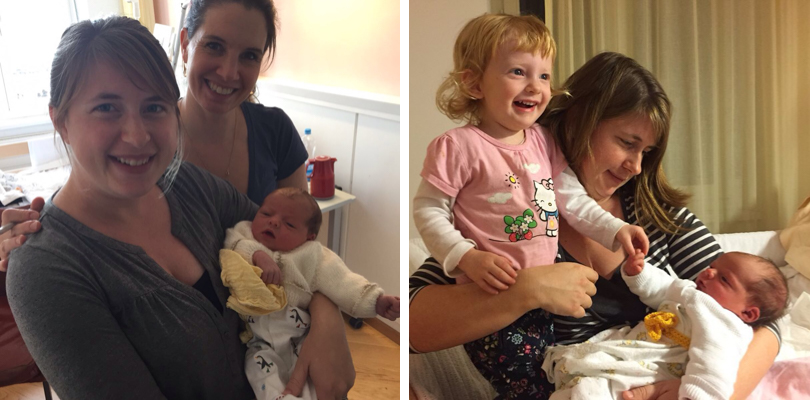
The hospital is almost like a hotel, with lake views, good food from an à la carte menu, en-suite shower rooms, and personal televisions. But best of all was the hospital’s focus on the recovery of the mother. While there I was given massages and injections of a natural remedy to help with pain I had in my back, arnica tablets and compresses to aid healing, special cream to help with red raw nipples in the early days of breastfeeding, and so much more. If I mentioned any pain or discomfort they were quick to try to find some way of easing it.
The day after Maya and I left hospital we had a visit from the Nachsorgehebamme (postnatal midwife) we had booked. During her visits in the first couple of weeks after the birth she weighed the baby, checked my uterus to make sure it was contracting down properly, gave me a massage on my stomach to help with the healing, offered advice with breastfeeding, showed me how to use my new baby carrier, and generally was on hand to answer any questions and make sure the baby and I were doing well.
Final thoughts on our Swiss birth
Since I delivered baby Maya in Switzerland, a friend asked me whether having a baby here was better than in the UK. To me it seems the area in which the Swiss system excels most is in postnatal care. In the UK with its stretched public health service, I felt there was very little focus on my recovery as a new mother, while in Switzerland my health and wellbeing was as important as the new baby’s. I also liked the fact I saw the same gynaecologist throughout the pregnancy, as this allowed me to build a rapport and trust with my doctor. I’d heard such good things about the hospital and its focus on natural birthing, and had so many good experiences with the friendly staff there, that I really trusted them to do the best for us and our baby, which I believe was vital to our having a successful birth.
A couple of months before having Maya, I would never have believed a natural birth without pain killers would have been possible for me, and I was in awe of those who did it. The hypnobirthing course gave me techniques that worked alongside those I had learned in pregnancy yoga classes and helped me to believe in myself and my body’s natural ability to give birth. I think this and the support of a hospital I trusted made it possible for me to have the kind of birth I wanted.
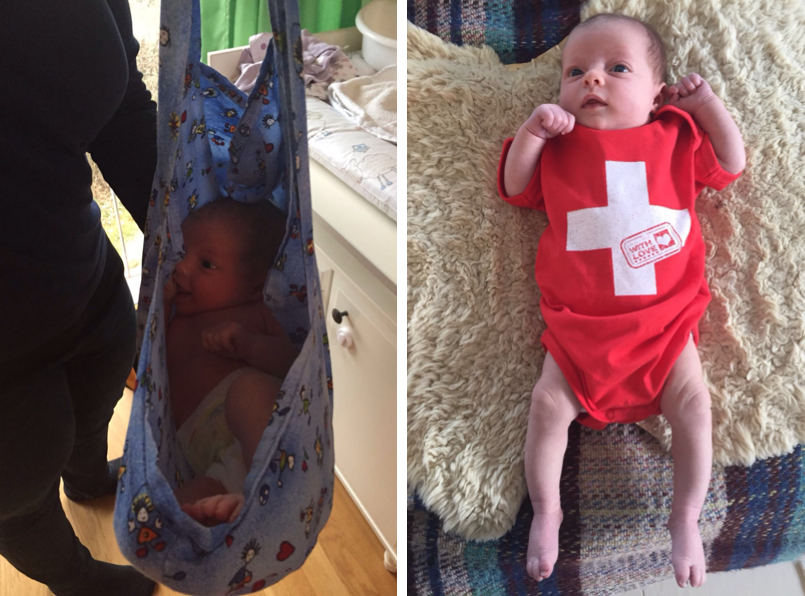
I can’t say that I couldn’t have had the same birth in the UK. If I hadn’t been diagnosed with gestational diabetes and had been able to have the baby on a midwife-led unit, perhaps it would have been possible. I am also a big supporter of the UK’s National Health Service (NHS) and believe that Brits need to remember how lucky they are to have a publically funded service and not have to worry about insurance cover. But I’m certain that in the UK I never would have had the same continuity of care provided by seeing one gynaecologist throughout the pregnancy and the kind of postnatal care and support I received here in Switzerland.
It will always be special to us that Maya was “made in Switzerland,” and we will be reminded of this when we see her passport, which has her place of birth as “Richterswil.” I will particularly remember the sound of the bells of the church next door to the hospital as they rang out an hour after Maya was born (as usual on a Sunday) and the sound of the town’s sirens ringing out for the country’s annual test as we were leaving the hospital. It almost felt like the bells and sirens were ringing just for us to welcome Maya into the world. We will be forever grateful that her birth was such a successful experience here.
Regarding the cost of my medical care, the final total including all gynaecological check ups, scans, screening and blood tests during the pregnancy, the delivery, hospital stay, newborn care, and post-natal home visits from the midwife came to 18,803 CHF (18,134 without medications). A significant part of this was the hospital stay: the cost of a straightforward vaginal delivery without complications and three-night stay in a private room came to 14,694 CHF.
If you’ve missed the previous Expat Bump Diaries, click here for week 36, here for week 28, here for week 21, here for week 16 and here for week 10.
By Laura Hollis
Laura is a journalist from the UK who is now living in Richterswil on Lake Zurich. Her first daughter was born in the UK in October 2014 and her second daughter was born in Switzerland in January 2017. Email: lauraesmehollis@gmail.com.
Photos by Samuel Hollis

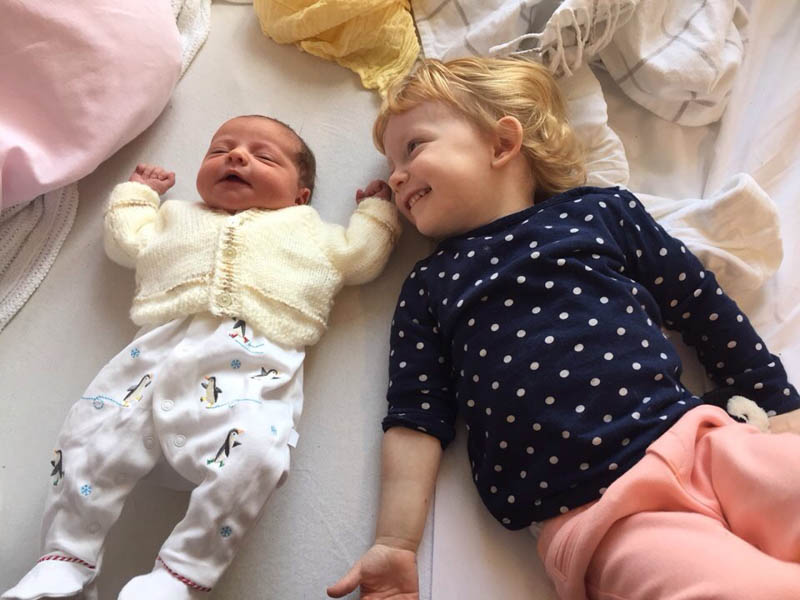

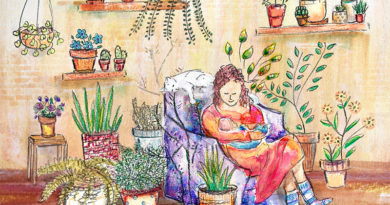

I just found your site today and was so happy to read about your wonderful Swiss birthing experience! I live in Geneva and am 36 weeks along with my first baby–so, I don’t have another birthing experience to compare to the wonderful care I have received so far. My husband and I are unsure how long we’ll be living in Switzerland, but I’m already wondering if we should try to schedule our move around a second baby (if we’re so lucky)! Thank you again for a lovely post.
P.S. I’ve been using hypnobirthing meditations as well. I hope I am as successful as you!
Hi Paige, Great to hear that your care was good. Let us know about your birth, did it go well? Hopefully so. 🙂
What a wonderful story, sounds like fun (I’m not ready for that yet =DDD). But I would like to ask you a question. Do you have any idea how long do doctors in Switzerland wait if the baby is not born according to set Due Date? Here in Czech Republic they wait for 10 days and then force the birth process. Any idea how is it in CH?
Hi Steph! It’s also ten days in any usual hospital in Switzerland, but I know that Paracelsus Spital in Richterswil, Zürich, will allow you to go three weeks with daily checks. I’m not sure if there are others like this in CH, but I know in many other ways Paracelsus breaks the norm too, so it wouldn’t surprise me at all if they are the only hospital like this nation-wide.
Johanna – Thanks a lot for your reply!
One of our contributors, Michelle Seaton-Witte had this answer:
”It varies on the place of birth and the OB.
Im happy to hear Paracelsus is cool about it (wow 3 weeks!). Delphys Geburtshaus and Züri Oberland might hesitate at going over 14 days because the risk of still-birth becomes significantly higher but you need to check with each institution whether birth house or hospital. I recently had a client who went well over 2 weeks at Triemli but only because she was very insistent and had done her research.
The mother has to be very informed about the reality of things like “failing placenta” or “oversized baby” (too often used as an excuse to induce) and of the risks related to going past due dates. By that I mean beyond 41 weeks, not 40. Here is some scientific research on being diagnosed with macrosomia (“big baby”) and here is some science based evidence on “due dates” ”